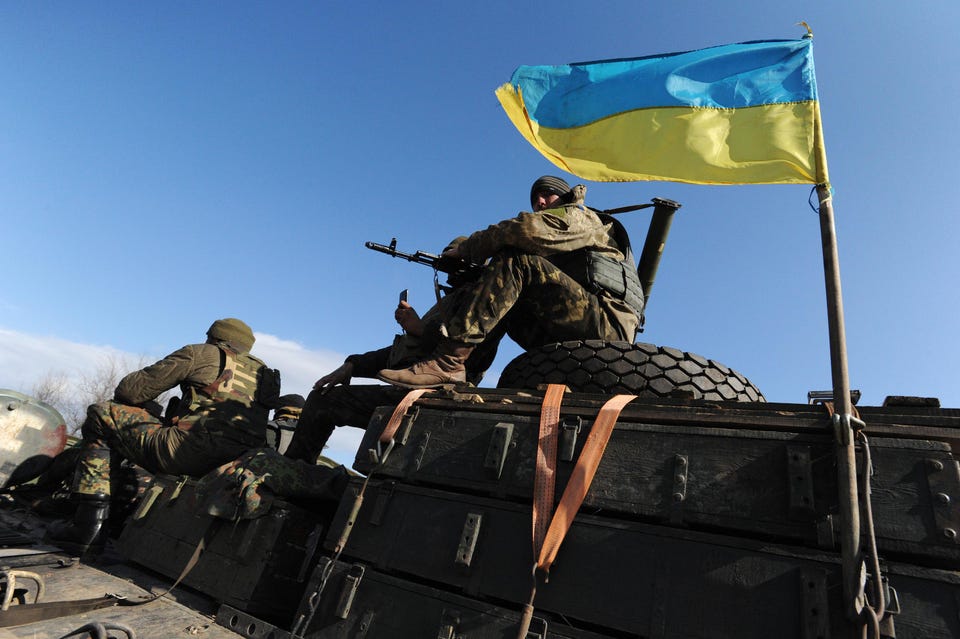Social Media Russia Has Radically Redefined The Term ‘Fake News’ During The Ukraine War John Brandon Contributor Opinions expressed by Forbes Contributors are their own. John Brandon covers social media trends. @jmbrandonbb New! Follow this author to improve your content experience.
Got it! Jul 31, 2022, 10:01am EDT | New! Click on the conversation bubble to join the conversation Got it! Share to Facebook Share to Twitter Share to Linkedin SOLEDAR, UKRAINE – FEBRUARY 27: Soldiers in the Ukrainian Army withdraw 15, 100 mm caliber artillery . . .
[+] guns in Soledar, eastern Ukraine, on February 27, 2015. In accordance with a February 12 ceasefire brokered by the leaders of Ukraine, Russia, Germany and France, Ukrainian forces and Russia-backed separatists agreed to stop fighting and withdraw heavy weapons from the frontlines of a conflict that has killed over 5,000 people in the past year. (Photo by Scott Peterson/Getty Images) Getty Images The term “fake news” has now become meaningless.
Just ask Mary Blankenship, a policy researcher at UNLV and a native of Ukraine. In analyzing some 34 million tweets about the Ukraine war , the graduate student and researcher for UNLV’s Brookings Mountain West found that there is an abundance of what she calls information pollution . The project started by researching about 12 million tweets but that number tripled in only three weeks.
Her main finding? Fake news is alive and well. Unfortunately, it is also very hard to pin down what “fake news” even means. Originally, on social media in particular, fake news was all about misinformation.
Since anyone with an email address can create a Twitter account, there is no vetting process and no way to verify anything you post. Twitter has worked hard to analyze its own platform and will occasionally block some content or issue a warning about potential misinformation, but uninformed opinions still rule the day. In just a cursory glance at tweets about the Ukraine war, it is not easy to tell who is disseminating factual information and who is merely on a soap box.
MORE FOR YOU A New Clubhouse Feature Aims To Increase Small, Private Chats—And Deeper Engagement Facebook Admits It Reported Faulty Numbers To Advertisers, Blames Apple AOC’s ‘Tax The Rich Dress’ – Ultimate Fashion Statement Or Display Of Hypocrisy And, it’s far worse in Russia. Blankenship found that the term “fake news” means something quite different in that country. Using the term “war” can lead to a 15-year jail sentence, she notes.
Russia routinely labels any information about the war as fake news, which means they have commandeered the term itself. Blankenship also found that VPN clients are banned, so it is extremely hard to find accurate information that is not filtered or blocked by Internet service providers. “This ‘information pollution’ shifts the focus from the actual issues into discussion of what is real and what isn’t, which can delay decision-making, or altogether stop decision-making.
In a volatile situation like this, where so many people’s lives are at stake, even a small delay in decision-making to discuss this disinformation can have serious repercussions,” she notes in her report. Because social media is partly a form of clickbait to increase traffic on websites, it doesn’t help that there are now hundreds of Russian-controlled sites that spread misinformation . What this means is that it is increasingly difficult to know if a post on social media that leads to a website is actually legitimate.
We’ve all been trained to think that a link helps validate a claim, but the people who spread misinformation know that a professional web design is all it takes to convince people something is true. Fake news is now such a fluid term that you only need a GoDaddy account to create a website and start spreading misinformation Blankenship says a good tactic is for the army of social media citizens to report information on the platforms that is obviously false. She also suggests that commenting on uninformed posts is not a good idea, mostly because the algorithm will reward popular posts.
The algorithms are not smart enough to know the engagement comes from those who disagree with the claims. In the end, that is the most serious issue of all: that the algorithms control the flow of news. Now that the term “fake news” is meaningless, we’ve handed over the news aggregation to bots that don’t seem to know the difference between truth and falsehood.
In the end, they only want you to click. John Brandon Editorial Standards Print Reprints & Permissions.
From: forbes
URL: https://www.forbes.com/sites/johnbbrandon/2022/07/31/russia-has-radically-redefined-the-term-fake-news-during-the-ukraine-war/



